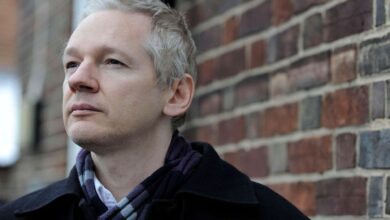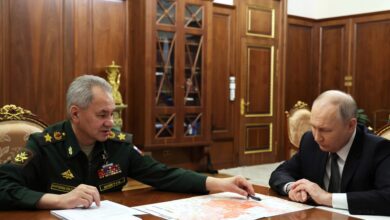Centre-right Stubb leads Finland’s presidential vote in early results

New president will have a central role in defining Finland’s NATO policies, amid growing security concerns about Russia.
Former Prime Minister Alexander Stubb has won the election runoff against ex-Foreign Minister Pekka Haavisto to become Finland’s next president, and take on the task of steering the Nordic country’s foreign and security policy now that it is a member of NATO.
With all votes counted on Sunday, the centre-right Stubb of the National Coalition Party had 51.6 percent of the votes, while independent candidate Haavisto from the green left got 48.4 percent of the votes. Initial voter turnout was 70.7 percent.
Stubb, who started his political career as a lawmaker at the European Parliament in 2004, won the first round on January 28 with 27.2 percent of the vote ahead of Haavisto with 25.8 percent. He has also led Haavisto in surveys, most recently by 6-8 percentage points.
Haavisto, 65, conceded defeat after a projection by the Finnish public broadcaster YLE showing a win for Stubb was released on Sunday night. He shook Stubb’s hand and congratulated him at Helsinki City Hall, where the candidates and the media were watching the results come in.
“This has been a fair, great race,” Stubb told Haavisto after the result was clear. “I’m proud that I have been able to run with you in these elections. Thanks for a good race.”
The vote marks a new era in Finland, which for decades has elected presidents to foster diplomacy, in particular with neighbouring Russia, and opted not to join military alliances in order to soothe tensions between Moscow and NATO.
But Finns changed their minds about playing that role after Russia began its full scale invasion of Ukraine in 2022, and the country joined NATO in April last year.
Now under the Western alliance’s security umbrella, the new president will replace Sauli Niinisto, who is retiring after two six-year terms in which he earned the nickname “the Putin Whisperer” for his previous close ties with Russian President Vladimir Putin.

Niinisto’s successor will have a central role in defining Finland’s NATO policies, while taking the lead on overall foreign and security policy in close cooperation with the government and while acting as commander-in-chief of the armed forces.
No relations with Russia
Both men campaigned as pro-European and strong supporters of Ukraine, taking a tough stand on Russia.
Lauri, a 36-year-old IT worker who voted in Helsinki, named Russia as the main task the new president will face.
“Obviously, we all know that we are in a difficult position nowadays looking at Russia, the entire turbulence in the world today. So I think that’s the biggest threat and biggest issue that we have,” he told Reuters on Saturday, without naming his preferred candidate.
In an interview with the news agency last month, Stubb said there would be no Russian pillar in Finland’s foreign policy for now.
“Politically, there will be no relations with the president of Russia or with the Russian political leadership until they stop the war in Ukraine,” he said.
Stubb is in favour of deep NATO cooperation, such as placing some NATO troops permanently in Finland and allowing the transport of nuclear weapons through the country. He does not support storing nuclear weapons in Finland, however.
“At times, a nuclear weapon is a guarantee of peace,” Stubb said in a debate on Tuesday.
Russia has threatened Finland with retaliation in response to its NATO membership and a defence cooperation agreement signed with the United States in December.
Haavisto, a former foreign minister who has also served as a United Nations peace negotiator and is known as a human rights defender, has called for a more cautious approach.
He wants to maintain Finland’s ban on nuclear weapons on its soil and considers a permanent NATO troop deployment unnecessary for the current security situation.



